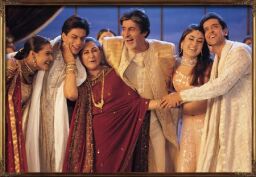Thursday, March 17, 2005
Culture is stronger than love in "This Moment"

I watched this short 13 minute experimental sort-of film on-line from a site called cinequestonline. The movie is called “This Moment”, the movie deals with of an Indian girl wanting to marry a black guy.

This Moment
It is true movies of the South Asian Diaspora will always represent their conflicts, in this movie it is the second-generation conflict of “interracial marriage” .
The subject of “Interracial” marriage and dating needs skillful handling in film not just a show casing. This film just states loaded dialogues without the film asking questions or seeking answers so important when making films based on race and ethnicity.
Uma: I am the cultural bearer
Uma: My ultra Hindu parents want to visit India with their Ph.D daughter and Doctor son-in-law.
Uma: If I married him, my parents would never talk to me again.
What do these dialogues mean, they just sound trite within the context of a 13 minute movie. There is no reconciliation of the main character Uma, not to her parents, not to herself and least of all to somebody who wants to marry her. The early morning sunrise shots of defeat, confusion, enlightenment, culture (whatever?) interspersed in between the movie held really had no symbolism.
Are parental rules being mistaken for culture? If that is the case, most of the diaspora films need to delve deeper into what the true Indian culture is. Culture is much more that dating or marriage.
In nearly all Bollywood movies lovers get happily married and walk of into the sunset with the entire family smiling. At the beginning of the movie the lovers are barred by their parents from meeting because of class and caste differences. But eventually the couple fights and shows strength of character leading to the parents themselves celebrating the wedding of the couple in jubilation.There is reconciliation, a victory that makes these movies dear to its audience.

Kabhi Kushi Kabhi Gham
Most of the diaspora movies and literature leave confusions unattended, open ended and unresolved. Of course “Bend it like Beckham” was an exception; it had the typical Bollywood ending happiness and reconciliation.

This Moment

It is true movies of the South Asian Diaspora will always represent their conflicts, in this movie it is the second-generation conflict of “interracial marriage” .
The subject of “Interracial” marriage and dating needs skillful handling in film not just a show casing. This film just states loaded dialogues without the film asking questions or seeking answers so important when making films based on race and ethnicity.
Uma: I am the cultural bearer
Uma: My ultra Hindu parents want to visit India with their Ph.D daughter and Doctor son-in-law.
Uma: If I married him, my parents would never talk to me again.
What do these dialogues mean, they just sound trite within the context of a 13 minute movie. There is no reconciliation of the main character Uma, not to her parents, not to herself and least of all to somebody who wants to marry her. The early morning sunrise shots of defeat, confusion, enlightenment, culture (whatever?) interspersed in between the movie held really had no symbolism.
Are parental rules being mistaken for culture? If that is the case, most of the diaspora films need to delve deeper into what the true Indian culture is. Culture is much more that dating or marriage.
In nearly all Bollywood movies lovers get happily married and walk of into the sunset with the entire family smiling. At the beginning of the movie the lovers are barred by their parents from meeting because of class and caste differences. But eventually the couple fights and shows strength of character leading to the parents themselves celebrating the wedding of the couple in jubilation.There is reconciliation, a victory that makes these movies dear to its audience.

Kabhi Kushi Kabhi Gham

Most of the diaspora movies and literature leave confusions unattended, open ended and unresolved. Of course “Bend it like Beckham” was an exception; it had the typical Bollywood ending happiness and reconciliation.

Comments
Post a Comment
<< Home